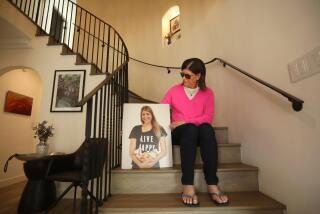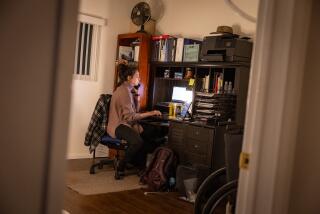She Shares Her AIDS Archive With the World
- Share via
In a San Juan Capistrano mobile home, Sister Mary Elizabeth Clark has labored for a dozen years on a homemade computer network creating what AIDS experts say is the most definitive -- and perhaps the most accessible -- source of information on the disease.
The 24-by-60-foot trailer a few blocks from the beach is the headquarters of the AIDS Education Global Information System, a free Web site with 750,000 documents on the pandemic.
The vast archive, which Clark and her staff of two update daily with articles from medical journals, magazines, news services and newspapers from around the globe, has had more than 7 million hits this year. AEGIS lists court decisions, fact sheets and treatment information at www.aegis.org. If anyone has come close to collecting the definitive AIDS library, it is the 64-year-old Clark.
She has built the computer network, negotiated with publishers for permission to use their material and has worked on average 18 hours a day for years updating the database.
“She provides incredible and important information for my daily life, and I couldn’t get along without it,” playwright and AIDS activist Larry Kramer said. “I want to know everything about AIDS and the politics of it and the treatment of it and the research of it. And in one Web site, she combines it all with such incredible skill and speed and accuracy that the mind boggles.”
Users include the afflicted and the powerful.
During the Clinton administration, Clark said, AEGIS software showed that each day at 9:30 a.m. Eastern time someone would access the Web site from the executive office of the president of the United States to check the latest postings.
For people in isolated areas who have access to a computer, AEGIS can be invaluable. Its “Ask the Doc” project, started in January, has fielded 170 questions from six continents, such as a recent one from an Ethiopian whose HIV-positive son is 4 1/2. The man wondered if his son would live long enough to go to college.
“To be able to write a medical doctor in the U.S. and get an answer to a question for free is really phenomenal,” said Dr. Mark Katz, who directs HIV care for Kaiser Permanente of Southern California and is AEGIS’ medical advisor.
AEGIS recently was nominated for inclusion in UNESCO’s Memory of the World Programme, which is dedicated to preserving valuable holdings of all types in archives and libraries around the world. The United Nations Educational, Scientific and Cultural Organization’s principal aims are to promote collaboration among nations, to fight intolerance and further human rights.
Kramer has suggested Clark for an award from the American Foundation for AIDS Research.
AEGIS, which has a budget of about $200,000, survives on grants, mostly from Connecticut drug manufacturer Boehringer Ingelheim.
Inside the trailer, the loud hum of a computer cooling system provides a 24-hour-a-day soundtrack to the work. Luckily for neighbors, there is plenty of soundproofing. AEGIS has taken over the dining room and living room. Clark has turned her bedroom into an office she calls her “command post.”
Long before she started AEGIS, Clark had a penchant for drawing attention. That’s what happens when you enlist in the Navy as a man and in the Army as a woman, then try to become an Episcopal nun.
She spent 17 years in the Navy as Michael Clark, where she learned electronics and scuba diving and rose to the rank of chief petty officer before being honorably discharged in 1974. Clark had been married twice by then and fathered a son. She underwent a sex change in 1975 and moved to Orange County to take care of her aging parents.
She enlisted in the Army Reserves in 1976, and her recruiter later said Clark had never hidden the fact that she was a transsexual. After 19 months of service, though, higher-ups voided her enlistment. The sex change, the Army said, disqualified her for enlistment. She sued with help from the American Civil Liberties Union, winning a $25,000 settlement and an honorable discharge.
Then she got religion, and controversy quickly followed. Clark had been reared in Pontiac, Mich., as a Southern Baptist -- a “right-wing religious zealot,” she called herself. But she said she fell away from religion because of racist churches she saw when stationed in the South.
In Orange County, she felt a pull back toward religion and began searching for a religious order dedicated to social justice. “I was interested in becoming a nun from when I was 8 years old,” she said.
Clark formed her own order and took vows of poverty, chastity and obedience at St. Clement’s By-the-Sea Episcopal Church in San Clemente. The bishop rejected them within the week. The Episcopal Diocese said she had not met the requirements for forming a new order, that she needed more sisters and more time.
Undeterred, Clark continues to consider herself a nun.
“I made my vows to God, not to a church,” she said.
In January 1989, she headed to Missouri to herd cows. The plan -- not a well-thought-out one, she now concedes -- was to make enough money ranching to donate beef to homeless shelters and the needy. It didn’t work out, but her time there led to her life’s work.
“I can safely say that if I hadn’t gone to Missouri, AEGIS wouldn’t have happened,” Clark said.
In the town of Stover, southwest of Jefferson City, a circuit-riding doctor showed up once a week for four hours. At the local Wal-Mart, she noticed a young man she thought had AIDS. In those days, an AIDS diagnosis meant death was imminent.
The man was terrified neighbors would learn of his disease and treat him as an outcast. It got her thinking about AIDS sufferers living isolated and apart from people who could provide emotional support and information on their condition.
She remembered her 1986 gallbladder surgery in Orange County, and the doctors and nurses who were fearful of her because of her sex change. She thought the emerging AIDS epidemic might have been behind their attitudes.
In fact, she was HIV-negative. “It was a good object lesson showing me how vulnerable an HIV-positive person was,” she said.
When Clark moved to her parents’ mobile home in San Juan Capistrano, she built a computer. Then she launched the electronic bulletin board that became AEGIS as the Internet blossomed.
“I didn’t think too far into the future,” she said. “It just started to ... grow.”
Clark still lives in the mobile home with her 91-year-old father, who is blind. The American Catholic Church, a small religious group that doesn’t require that clergy be celibate, has recognized her as a nun. Occasionally, she attends a Roman Catholic church.
“I think everyone has to ... [learn] it’s not the religion, but the spiritual relationship you have with God that’s important,” she said.
Clark has two full-time assistants and an accountant who is trying to put the organization on solid financial footing. She still rises at 5 a.m. and peruses the Web for items AEGIS should pick up. But her role these days is to ensure that the computers keep running.
“I’m in the background,” she said, at which her helpers laughed.
Clark knows she must train others so AEGIS can continue without her.
“We are in effect the de facto history of the epidemic,” she said. “I never knew we’d grow this big.”
More to Read
Sign up for Essential California
The most important California stories and recommendations in your inbox every morning.
You may occasionally receive promotional content from the Los Angeles Times.














